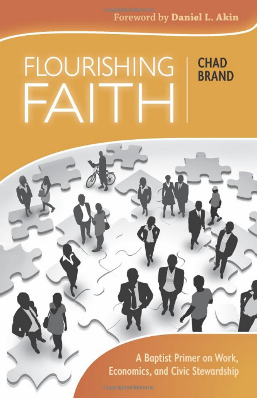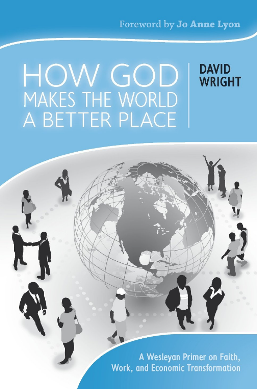In the latest issue of Faith and Economics, a bi-annual journal from the Association of Christian Economists, Dr. Robert Black reviews two of CLP’s four tradition-specific primers on faith, work, and economics: Chad Brand’s Flourishing Faith (from a Baptist perspective), and David Wright’s How God Makes the World a Better Place (from a Wesleyan perspective).
Black reviews each book quite closely, aptly capturing the key ideas and themes in each, and concluding that both are “well suited as a non-technical introduction to biblical and theological aspects of work, wealth, church history, and economic systems.”
As a sample, here’s Black’s summary of the Wesleyan connection between Christian conversion and broad-scale human flourishing:
The final section of [Wright’s] book…contrasts an unconverted will at work with the converted will at work. While we may wish not to work at all, we are not freed by conversion from work. Instead, we are freed to enjoy work, “to experience work as the expression of all that is most beautiful and magnificent about us.” Instead of a “lifetime of self-centered pursuit,” Wright encourages us to “use [our] influence to nurture the kind of economic and legal systems that favor meaningful, rewarding work.”
What kinds of people are Christians called to be and how do those characteristics affect economic activity? Chapters 1, 2, and 3 of Part Three develop three character traits to which converts to Christ are called to be: people of assurance, people of integrity, and people of authenticity; Assurance of God’s calling overcomes the “[i]nsecurity and fear [that] are terrible burdens to carry into our work” (p. 28). In a “world … awakened to the desperate need for the renewal of ethics,” personal integrity is most welcome (p. 35). Authentic Christians, who are true to the character of Jesus Christ, the original ideal for us, are an antidote to those people who seek to be authentically true to their own selfish hopes and misguided desires.
 Black on the inherent entrepreneurialism of Baptist churches:
Black on the inherent entrepreneurialism of Baptist churches:
[Brand] asserts that Baptist churches and their associations have grown due to their adherence to biblical principles that are consistent with innovation, productive labor, private charity, and limited government. Brand also asserts that the Baptist “free church” flourished spiritually and numerically because its organizational structure was superior to the bureaucratic state-church form.
In short, consider this comparison. Official state churches are as inflexible as the Hudson Bay Company trappers were due to their bureaucratic control by company officers in London who were thousands of miles and six months away by boat. On the other hand, independent Baptist churches and independent Methodist churches were as flexible as the Northwest Trading Company trappers whose entrepreneurial form of independent owner-trapper-traders out competed Hudson Bay’s trappers, in spite of geographical and cost disadvantages. In any organization, entrepreneurial leaders can respond more rapidly than bureaucratic followers to changing circumstances. All well and good when change is in a beneficial direction.
Black’s summary and recommendation of the two:
Each of these two books is well suited as a non-technical introduction to biblical and theological aspects of work, wealth, church history, and economic systems. Brand is broadly biblical and historical, offering a Baptist perspective on religious and economic freedom, and on related matters of recent U.S. economic history…Wright draws specifically from the Wesleyan tradition regarding conversion and discipleship and shows their practical potential to influence the work place for the good of all. Wright also emphasizes private personal and social assistance for the poor as part of the holiness tradition. Together, the authors assert that economic and religious liberty are consistent with and important to Baptist and Wesleyan traditions regarding work and private commerce with others and compassion for others…These two books may well generate important discussion among those in the Baptist and Wesleyan traditions about beliefs that they hold on work and economics, as editors of the series intended.
Purchase Chad Brand’s Flourishing Faith.
Purchase David Wright’s How God Makes the World a Better Place.
For other primers in the series, see here.
[product sku=”1310”]


